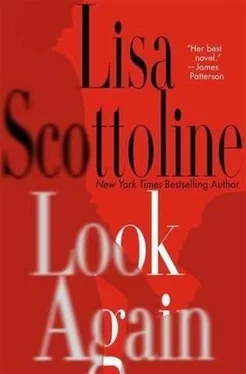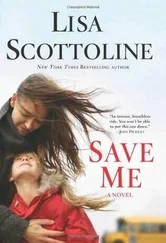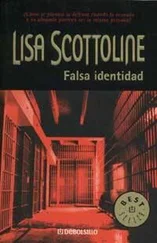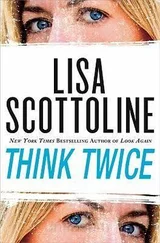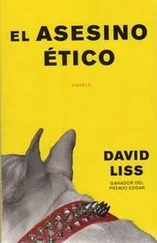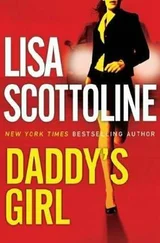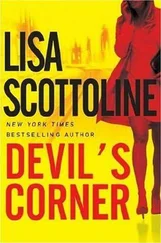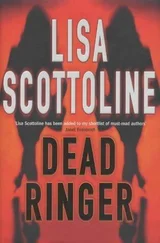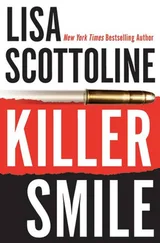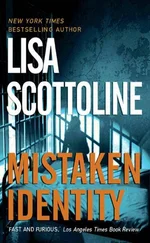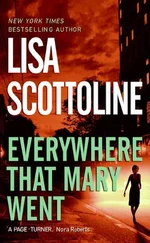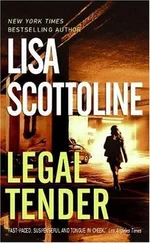"Why not call her, even for background?"
"I know what I'm doing." Ellen braked, checking the car on the way downhill. "Let me handle my end. You handle yours."
"Have it your way, but make that deadline."
"I will."
"Good-bye." Sarah hung up, and Ellen hit the gas. She had to make the deadline, or she was out of a job. She pressed the button for information, then took the ramp to the expressway.
Heading east under a threatening sky.
Ellen got ahold of Lateefs teacher, Vanessa James, while her class was down the hall at the library. Tall and rail-thin, the teacher munched on a green apple as she moved quickly around the classroom, picking up stray books and crayons, straightening undersized chairs, and restoring a knit hat to its cubbyhole.
Vanessa asked, "It's all right with Laticia if we talk, right?"
"Yes, I called her on the way over. Sorry it's such short notice."
"No problem." Vanessa wore a long red sweater with black slacks and low heels. She had large eyes, a smile slick with lip gloss, and her hair straightened into a stiff bob, which showed off tiny diamond earrings winking in her earlobes. "We have fifteen minutes until they get back. What do you want to know?"
"Just a few things." Ellen slid her notebook from her purse and flipped over the cover, pen at the ready. "What kind of kid was Lateef?"
"Right to it, huh?" Vanessa paused in mid-bite, the apple at her mouth, her gaze suddenly pained. "Teef was like a light. You could say he was a class clown, but that wouldn't do him justice. He was the one who made everybody laugh. But he was a leader."
"Is there any example you can recall?"
"It hurts my heart to think about it." Vanessa tossed the apple into a scuffed brown wastebasket, where it made a loud clunk. "Okay, here's one. On picture day, he combed his hair flat as he could, which wasn't much, and he said he was Donald Trump. The photographer told him to cut it out, and he said, "You're fired." Her pretty face relaxed into a smile, which vanished as quickly as it had appeared. "All the kids looked up to him. We just finished our unit on African-American history. It's part of the new core curriculum in social studies the SRC set up."
"SRC?"
"School Reform Commission. For Dr. King's birthday, Lateef was voted to be Dr. King. He memorized a few lines of I Have a Dream," and he did a great job. He liked to be in front of the class." Vanessa paused at the memory. "He was quick as a whip. We do basic addition and subtraction, but he could have moved on to the third-grade curriculum, fractions and geometry. He was good on sentence structure, too; we have to get them ready for the PSSA'S."
"What's that?"
"State tests. On our report cards, I have to pick from a lot of categories, like "eager to try new things." Vanessa chuckled softly. "Lateef was my category buster. He was his own little category."
Ellen made rapid notes. "So how did the class deal with his murder?"
Vanessa shook her head, with a sigh. For a second, she seemed to focus on the large bulletin board on the wall, which was covered with red construction-paper hearts, each with a fold down the center. At the top of the board, gold glitter read, Get Ready For Valentine's Day In2But!
Ellen waited for the teacher to respond. Experience had taught her that silence could be the hardest question to answer.
"These kids, they're used to death. We lost two kids already this school year, and it's only February." Vanessa kept her face to the bulletin board. "But Lateef, everybody knew him. Everybody felt him. The District sent us grief counselors. That child was too full of life not to be missed."
"Do the kids talk about it?"
"Some of them, and some of them cry. They'll never be the same. They're not innocent, like children are supposed to be." Vanessa turned to her, her lips forming a tight line. "What I see is a real deep sadness, and it goes all the way inside. These kids, they're heartsick. And those are the lucky ones."
Ellen didn't get it. "What you mean?"
"The unlucky ones, they don't even know what's bothering them. They can't express their feelings. They have an underlying grief and fear, but instead of expressing it in words, they act out. They fight. Bite. Kick. Bully each other. Their world isn't safe, and they know it." Vanessa pointed to one of the desks by the window, in the second row. "That was Teef's seat. It's there, empty, every day. I think about moving it, but that only makes it worse."
Ellen felt a pang. She thought instantly of Will's cubbyhole in his preschool, with his name card and a picture of Thomas the Tank Engine. What if one day that were empty, never to be filled again? "What will you do?"
"I'll leave it there. I have no choice. The first week, we made a little memorial and the kids brought flowers. Here, come look at this." Vanessa crossed to the desk with Ellen following her, and she lifted up the desk lid. Inside the well sat a huge pile of cards and dried red roses, their petals shriveling to black. "These are his Valentine's Day cards. Every day somebody comes by with another one. It kills me."
Ellen looked at the cards, thinking. It kills all of us.
"You know who you should talk to, if you really want to understand the effects of the murders in this city?"
"Who?" Ellen asked her, intrigued. The best leads always came from other leads.
"My uncle. He'll see you, if you can handle it."
Ellen was standing in the Glade-scented entrance hall of the funeral home with its proprietor, Ralston Rilkey. He was a slight man with a compact frame, in his early sixties, and he wore his hair cut short and natural, with steel gray coils tangled at the temples. He had a short forehead, and his eyes were worried above a wide nose and neatly groomed mustache, also going gray.
"And what is it you want to know again?" Ralston asked. "I'm fairly busy. We have two viewings tonight."
"I'd like to know how you've been affected by the murders in the neighborhood. There's been so many lately, especially of children like Lateef Williams. Your niece told me you might help, and Laticia gave her permission to talk to me."
"I'll speak with you, but the interview must be respectful. Here at Ralston-Hughes, we practice dignity in death."
"I understand."
"Then follow me." Ralston left, and Ellen followed him across a red-carpeted hallway, through a paneled door that read EMPLOYEES ONLY, and downstairs into the basement of the converted rowhouse. The carpeting morphed into institutional gray tile, the temperature dipped slightly, and the fake-floral scents were eradicated by a starkly medicinal odor.
"Is that formaldehyde?" Ellen asked, making a note.
Ralston nodded, his bald spot bobbing as he walked ahead, and they reached a set of white double doors, which he opened. The odor grew stronger, and on the wall hung white smocks and plastic face shields. Stainless-steel shelves held boxes of cotton, jars, and bottles with labels that read Kelco Gold Series Arterial Embalming Fluid and Aron Alpha Instant Adhesive. Ellen made notes, trying not to shudder.
Ralston opened another door, and she found herself in a larger room with a glistening white table at its center, tilted at an angle. He stood behind the table in his suit of dark green, gesturing with evident pride. "This is our preparation room, one of them. You'll notice the table is porcelain. Porcelain doesn't react with the embalming chemicals."
"Would you fill me in on the procedure, generally?"
"The first step is washing and disinfecting the body. Embalming is simply the process of displacing blood with fluid, usually of formaldehyde preservative with a red dye, to give the flesh a lifelike appearance. Even African-American skin takes on a pallor once the blood is removed."
Читать дальше
